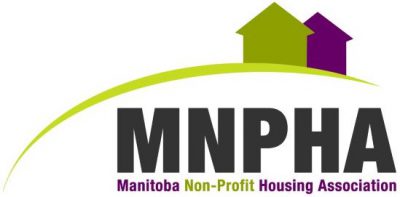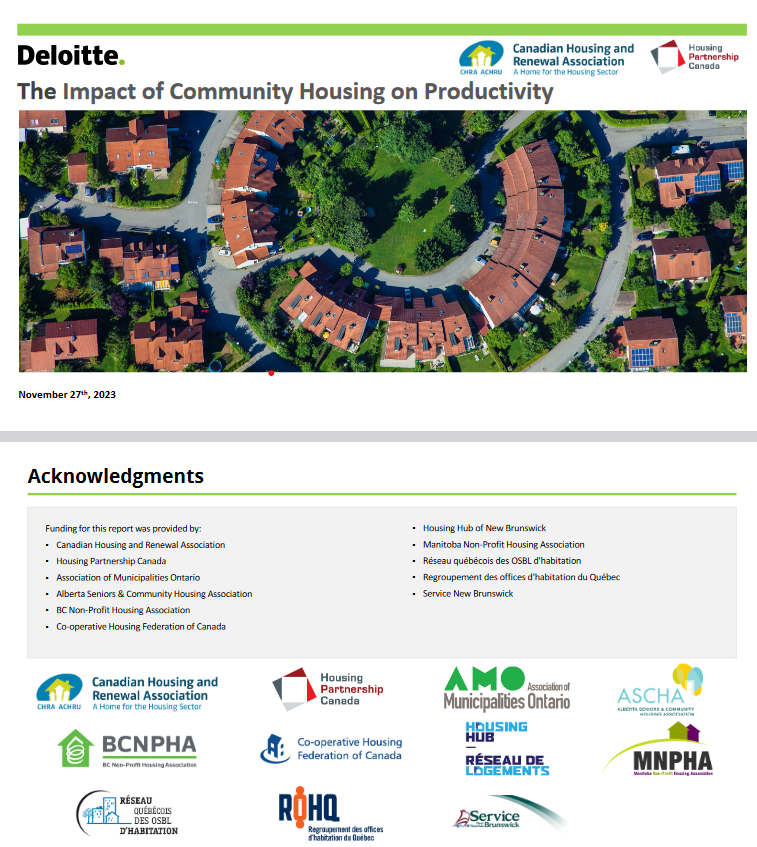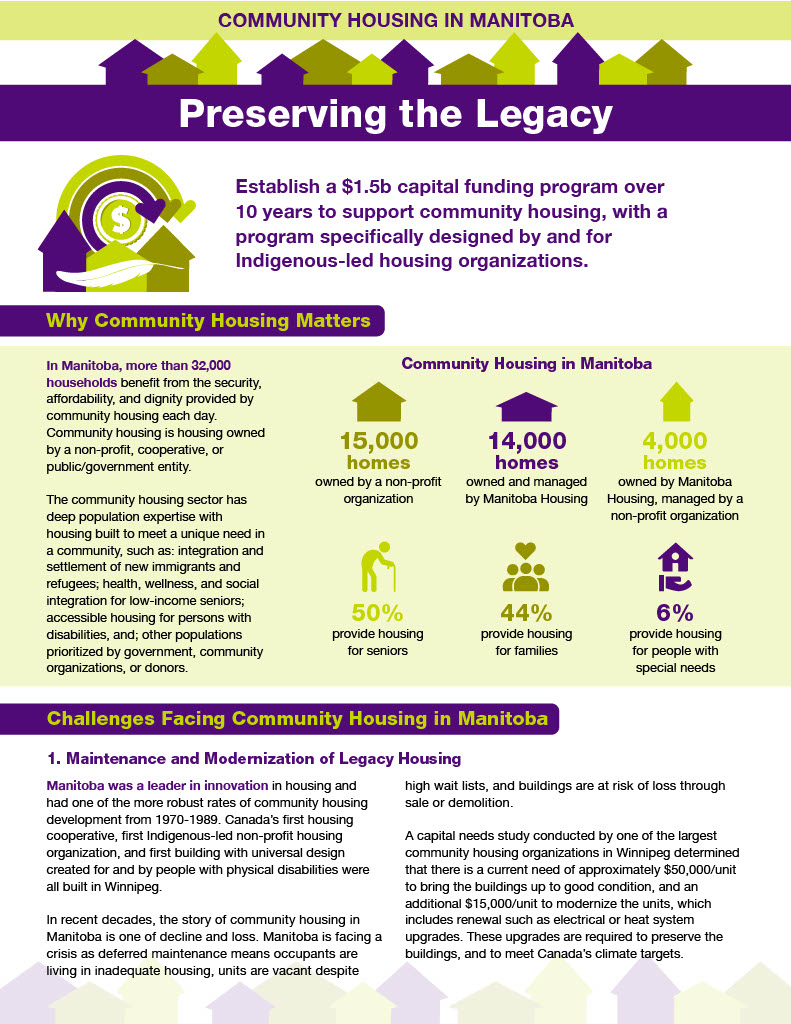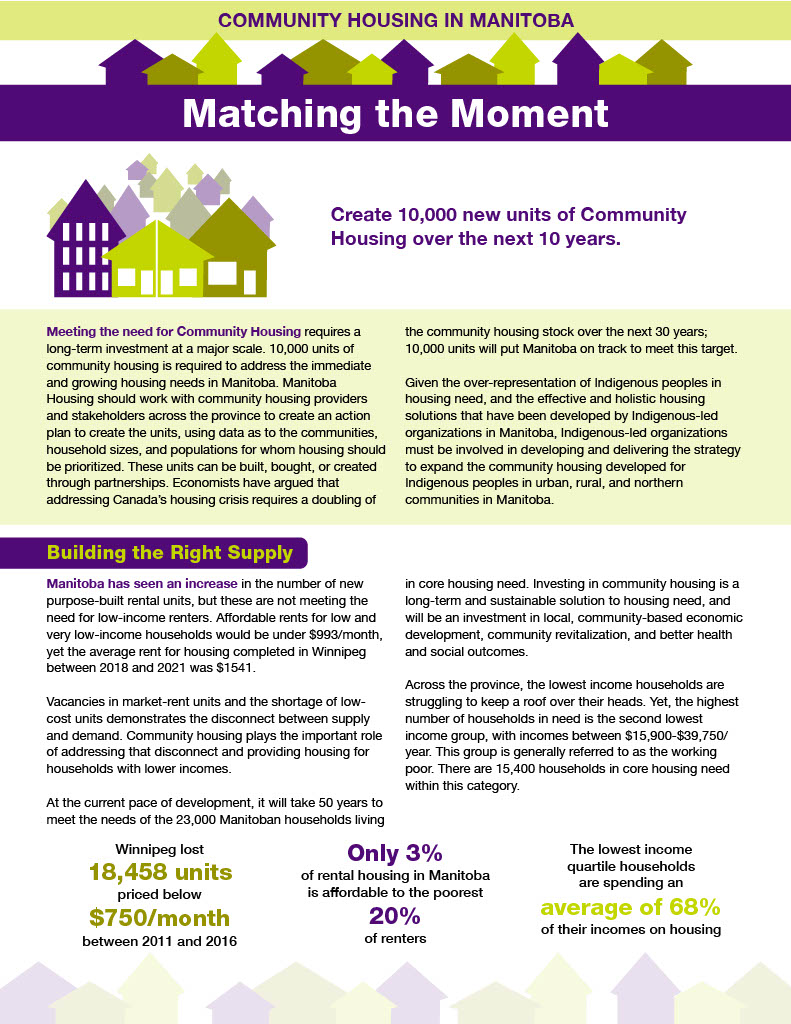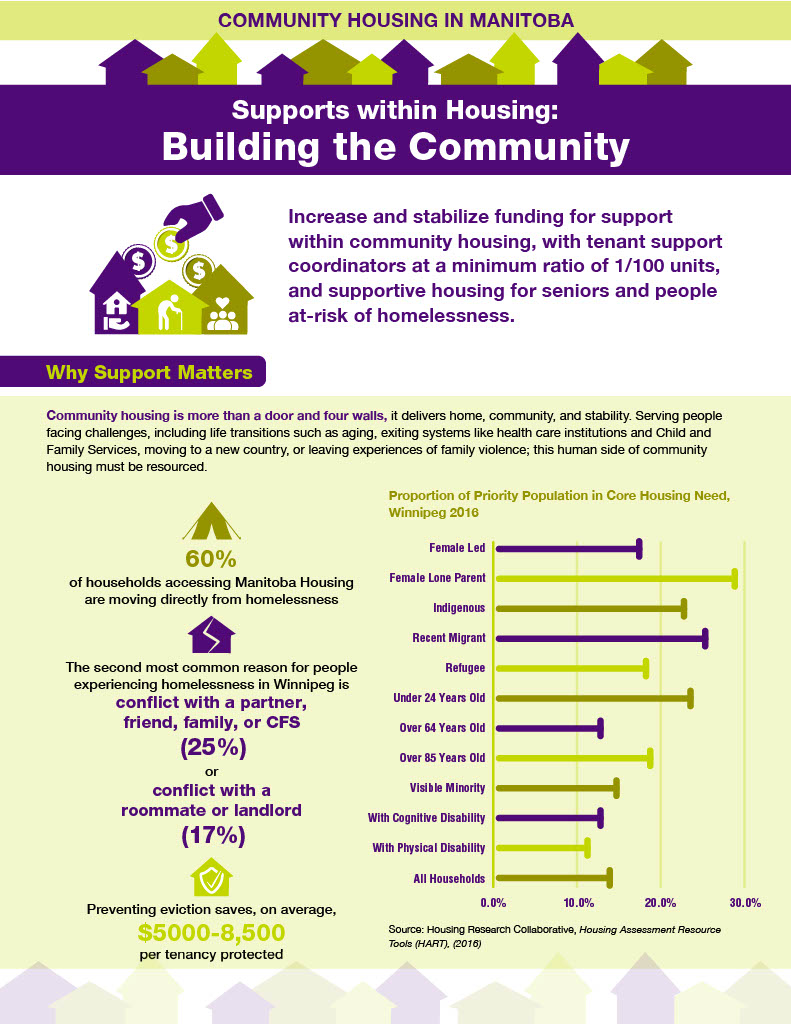The Impact of Community Housing on Productivity
2023
MNPHA was a partner on a research project to investigate the relationship between community housing and economic productivity.
The partners commissioned Deloitte to produce the report, The Impact of Community Housing on Productivity, which finds:
- There is a causal connection between the proportion of community housing within the overall housing stock and gains in economic productivity.
- Bringing Canada’s community housing stock to the OECD average by 2030 would boost economic productivity by a staggering 5.7% to 9.3%.
- In Manitoba, it would be a 3.5% to 5.8% increase
- The economic benefit would increase GDP by an estimated $67 billion to $136 billion, without adding to inflation since gains in productivity boost our economy’s ability to grow.
- In Manitoba, this would be a $0.9B-$2.2B increase in GDP.
- CHRA estimates that gains to the economy will outweigh the costs within two years of hitting the target.
- The economic gains are from the productivity-enhancing benefits of having more community housing, rather than just the stimulus impact of building new homes. The impact is derived from addressing five productivity-depressing phenomena:
- Geographical mismatch between workers and jobs that are the best fit;
- Diminished human capital accumulation due to poor living conditions;
- Neighbourhood effects that impact wellbeing and opportunities;
- Diversion of income towards housing costs rather than upskilling; and
- Depressed business investment and captive employment.
Working with our members MNPHA presents the 2023 Election Priorities for Community Housing
Establish a $1.5b capital funding program over 10 years to support community housing, with a program specifically designed by and for Indigenous-led housing organizations.
Manitoba is facing a looming crisis as deferred maintenance means occupants are living in inadequate housing, units are vacant despite high wait lists, and buildings are at risk of loss through sale or demolition.
An investment of $1.5B could preserve the 23,000 homes currently in fair condition; it would cost 4 times more to replace this housing.
Create 10,000 new units of community housing over the next 10 years.
At the current pace of development, it will take 50 years to meet the needs of the 23,000 Manitoban households in core housing need.
Creating community housing is a sustainable solution, and an investment in community-based economic development, community revitalization, and better health and social outcomes for decades to come. Economists have argued that addressing Canada’s housing crisis requires a doubling of the community housing stock over the next 30 years; 10,000 units will put Manitoba on track to meet this target.
Increase and stabilize funding for support within community housing, with tenant support coordinators at a minimum ratio of 1/100 units, and supportive housing for seniors and people at-risk of homelessness.
Community housing is more than a door and four walls, it delivershome, community, and stability. Evidence-based solutions are r equired to offer choice and meet varied needs. Preventing eviction, reducing social isolation, and providing resource connections for tenants creates healthier and safer communities, and reduces the need for high-cost emergency or institutional services.
The 2023 Election Priorities for Community Housing are informed by research on housing need across Manitoba.
MNPHA commissioned a report to summarize community housing need in Manitoba using data derived from the 2021 Census. The full Community Housing Needs Assessment can be downloaded here

Canadian Rental Housing Index
2021 Census Data now Available!
The Canadian Rental Housing Index (CRHI) is a comprehensive database of rental housing statistics, displaying information for more than 800 regions and municipalities across the country. The Index provides a data-driven foundation for policy-making decisions at all levels of government and the community housing sector.
The Index can be used to track and compare average rental costs, how rental housing spending compares with income, and the rate of overcrowding in municipalities, regions and provinces.
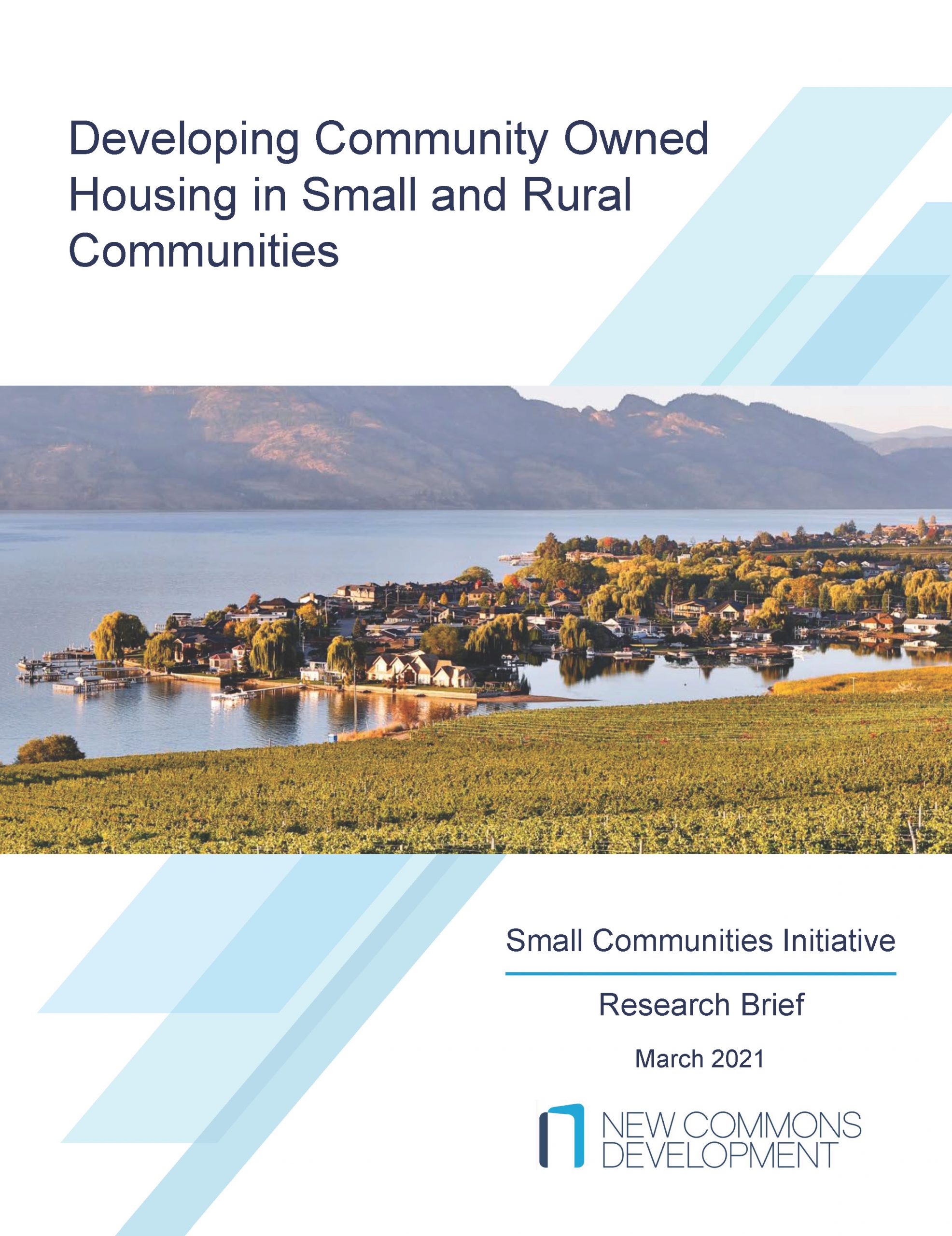
Small Communities Initiative: Developing Community Owned Housing in Small and Rural Communities Research and Resource Guide
This research centres on identifying:
1. The challenges in developing community housing assets in small and rural Canadian communities;
2. The tools, resources, and supports that are available to community housing organizations to achieve investment readiness, and progress through the stages involved in developing and delivering new community housing assets, and;
3. Existing gaps and opportunities for new tool and resource creation to further support and mobilize the sector.
In short, this research focuses on how organizations in small and rural communities prepare themselves and their projects to be “shovel ready” and manage the associated risks. This includes all of the initial phases of development work, such as organizational readiness, project planning, partnership arrangements, feasibility assessment, and the development of sound funding and financing strategies.
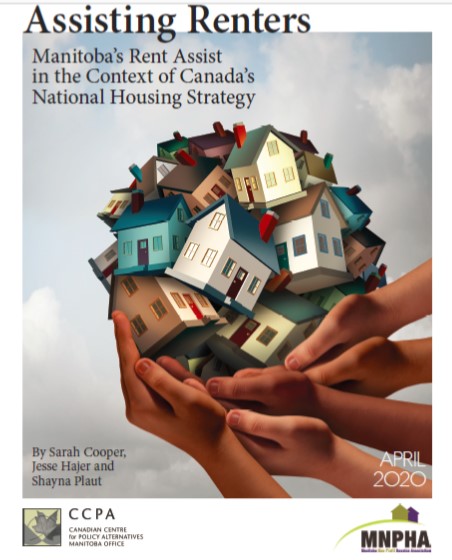
Assisting Renters Research
Rent Assist — a Manitoba rent supplement program introduced in 2014 — offers a unique approach to providing financial assistance to low-income Manitobans. Because eligibility for Rent Assist is solely income- and family size-based rather than tied to a particular unit or demographic, it has been identified as one of the more innovative rental supplement programs in the country. Therefore, when the 2017 National Housing Strategy was released with a provision for a portable rental supplement, Rent Assist was identified by housing advocates in Manitoba as a possible exemplar. The Manitoba Non-Profit Housing Association (MNPHA), the Canadian Centre for Policy Alternatives-Manitoba (CCPAMB) and University of Manitoba researchers came together to study Manitoba’s Rent Assist program and determine what is working, what is not working, and what can be better from the perspectives of tenants, private landlords, and non-profit housing providers throughout the province. The intent of this report is to share the insights and lessons learned for future national and provincial housing programs.
The project was funded by Canada Mortgage and Housing Corporation

Navigating Non-EIA Rent Assist: Challenges and Better Practices Throughout Manitoba
One of the key findings from the Assisting Renters research was that despite the many benefits of the program, Non-EIA Rent Assist is underutilized and not well-known. MNPHA and CCPA-MB partnered on a follow-up project documenting what is working well to promote the program in communities across Manitoba, as well as the challenges to doing so.
The project was funded by the Manitoba Research Alliance
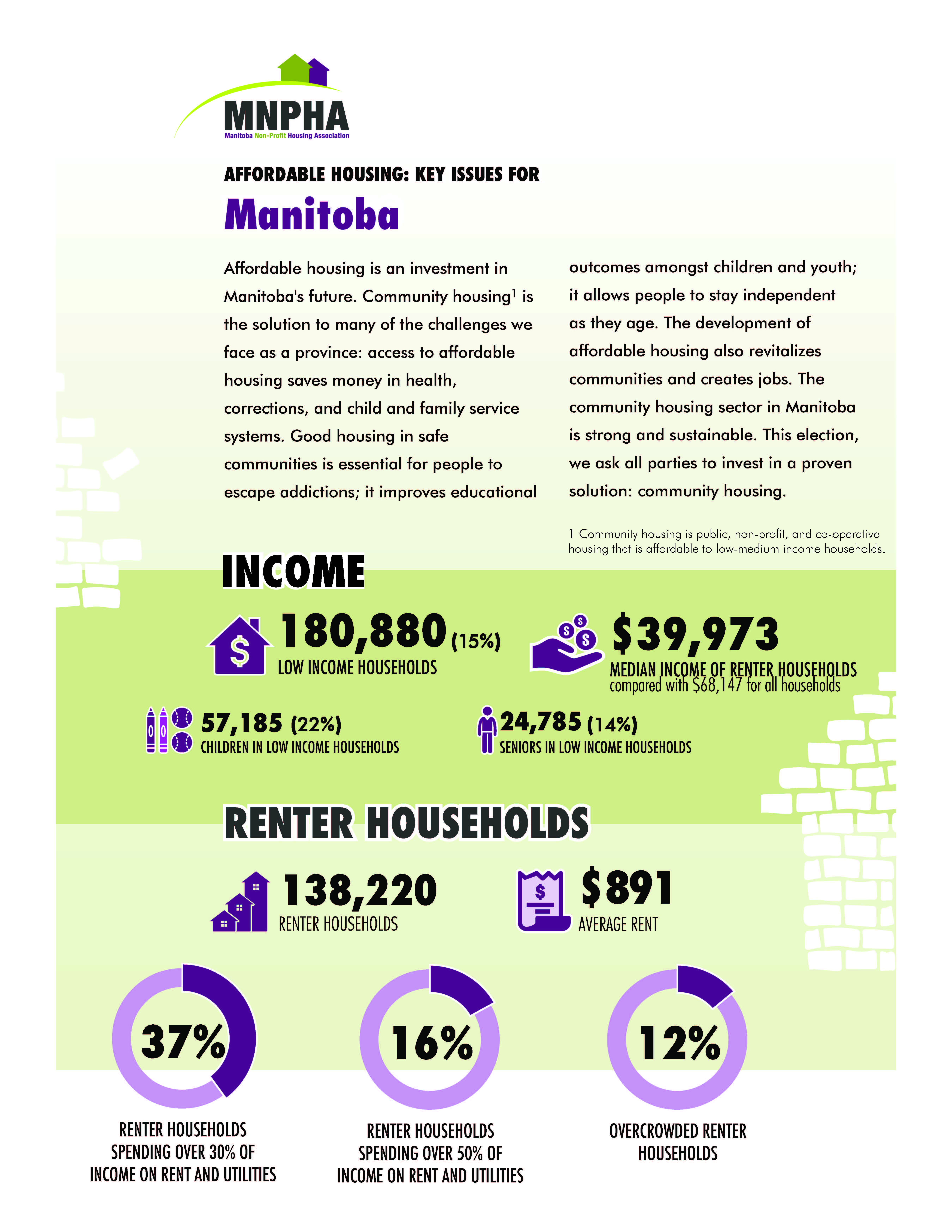
Provincial Policy Platform
July 26, 2022
Affordable housing is an investment in Manitoba’s future. Community housing is the solution to many of the challenges we face as a province: access to affordable housing saves money in health, corrections, and child and family service systems. Good housing in safe communities is essential for people to escape addictions; it improves educational outcomes amongst children and youth; it allows people to stay independent as they age. The development of affordable housing also revitalizes communities and creates jobs. The community housing sector in Manitoba is strong and sustainable. This election, we ask all parties to invest in a proven solution: community housing.
Download our fact sheet with our election asks and share it with your provincial candidates

Cannabis Legalization Introduction and Overview
A legal brief on cannabis legalization as an overview of the legislation and summary of options for housing providers, which has been reviewed by legal experts, is now available for MNPHA Members. You can request a copy by sending an e-mail or phoning MNPHA.

Key Issues in Affordable Housing
Cities can be strong advocates and partners for affordable housing. They can develop plans, provide funding, and implement regulations that support an increase in affordable housing.
MNPHA developed fact sheets on affordable housing in nine of Winnipeg’s largest municipalities. We hope members will use them to engage with municipal representatives, to work together on meeting Manitoba’s affordable housing needs.
